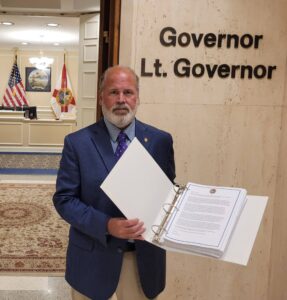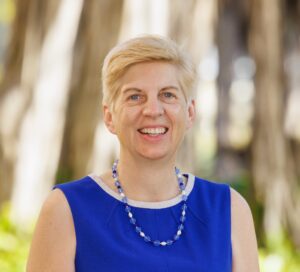But teachers’ unions are energized.
By Johannes Werner
Original Air Date: Feb. 23, 2024
Host: Private-sector unions are on a roll in Florida. Just think UPS drivers, Stellantis autoparts workers, beer distributors, and Starbucks workers. But public-sector unions are under political pressure. Senate Bill 256 — presented by the law’s sponsors as the “Payment Protection Act” — has been a double whammy for public sector unions since the legislature passed it last year. It prohibits automatic paycheck deductions of union dues. But most importantly, it raised the bar, forcing union locals to represent at least 60% of employees, in order to be recertified. Now, as union chapters are filing for re-certification, the law’s teeth are beginning to bite. Our news team had a close look at how union locals in our region are coping.
Johannes Werner: To say it right away: It seems SB 256 takes a big bite out of the 34,000 unionized workers who call Manatee and Sarasota their home.
Hundreds of public employees in Manasota have lost union representation since the beginning of this year, when their locals failed to reach the 60% minimum of dues-paying members the new law requires.
It was the end of the run for the local representing hundreds of City of Bradenton employees; they all lost representation by AFSCME — short for the American Federation of State, County and Municipal Employees. Same for non-teaching employees of the University of South Florida.
AFSCME also represents non-teaching employees at New College and City of Venice employees. Neither of these chapters returned calls to WSLR News before deadline. Nor did the Region 2 office of AFSCME in Tampa.
City of North Port employees are also represented by AFSCME. They failed to meet the recertification bar, reaching barely 40%.
To be sure, the current law allows for a Plan B. If a union chapter can produce enough signatures on what’s called “interest cards” — showing union support of everyone, including workers who do not pay dues — the state may recertify them.
Dominick Caravella, representing AFSCME Local 3432 in North Port, told WSLR News he believes interest cards they have been gathering will show the support of at least 60% of City of North Port employees needed to re-certify his chapter.
Caravella is sanguine about the new Florida law: “I don’t like it, but it’s the law,” he told WSLR News. “It was passed down by the governor, and we’re trying to make the best of it.”
Rich Templin is the political director of the AFL-CIO in Florida. He says the rollout of the new law has been glitch ridden.

Rich Templin
Rich Templin: This first round of decertifications that we’re seeing across the state is largely being driven by an absolutely chaotic rollout of Senate Bill 256. And following the bill passage, the Public Employees Relations Commission had to enter into a process of rule making. In other words, you know, how do we practically implement the new statutes? And that process has been marked by confusion, rapid-fire changes to rules that had already been published. And so, a lot of our affiliate unions around the state have really been operating without a super clear picture of what they needed to do and what they needed to focus on. We are getting some finality to how this bill is going to be implemented. The Florida Senate just two days ago passed a glitch bill that cleans up some of the uncertainty in last year’s law. It’s important for your listeners to understand that the bill was not written by anybody in Florida. It was written by an out-of-state think tank, the Freedom Foundation. That’s a billionaire-funded think tank that’s going around the country, interfering with people’s rights to join and maintain their unions.
However, not all is doom and gloom for public service unions here. Quite the contrary.
Governor Ron DeSantis singled out teachers’ unions in the signing ceremony as a target of the law. But in an unintended consequence, SB 256 seems to be energizing teachers here.
The United Faculty of Florida chapter at New College — which has sued the new leadership of the campus in Sarasota and is about to file its third grievance in less than a year — is well on its way to reach the 60%, according to UFF representative Katie Walstrom.

Walstrom
Katie Walstrom: New College has always had a very a pretty high membership percentage for the faculty union. Last year, we were usually like in the 70% region. Last year, we made it up to 80%. But then, many faculty left, so that this year we’re around 65%, maybe a little bit less. And so that’s sort of been our progress. I feel very lucky that we are over 60% this year. Most union leaders feel like this is a distraction from the things that we shouldn’t be doing. And we’re basically being bullied into showing that we’re actually doing something useful for the employees. So that part is frustrating. In part it feels like a waste of time. There’s also like a fear factor, because chapters if they’re not at 60%, they have to go through the card campaign and another election in order to keep their collective bargaining agreements. And that is scary for some people that they could lose all the work rules that have been bargained by the union.
JW: Meanwhile, the teachers’ unions representing the Manatee and Sarasota school districts both passed the 60% threshold with flying colors.
The teachers’ union in Manatee County boosted its dues-paying membership from 53% to nearly 73%, now representing more than 2,800 employees. The Manatee Education Association is affiliated with the American Federation of Teachers.

SC/TA members: The union now represents 72% of teachers in the district.
And the independent Sarasota Classified/Teachers Association says it was re-certified in October, with dues-paying members making up 72% of the teacher body in the district.
SC/TA President Rex Ingerick is not only elated about this achievement. He’s angry, too.
Rex Ingerick: Well, I’m real proud of our membership for standing up for their their rights, our collective rights, to continue to have our union be certified, and for them and to keep our current contract in effect. It was a lot of work, but our members stood up and did the hard work to get everyone signed up. So I guess my word would be ‘proud’. […] The legislature and the governor carved out the police, firefighters’ and correction officers’ unions as not having to meet the standards that the rest of the public unions in the State of Florida have to meet. Not only do we have to have 60%, but we have financial audits as well. And they will not collect dues through our employer anymore. So obviously those other three unions … they call it the “Paycheck Protection Program” was the name of the bill. If it really is trying to protect paychecks, why wouldn’t they be trying to protect the first responders’ and our correction officers’ paychecks as well? So it just seemed like it was, you know, more of a political retaliation for the State of Florida teachers’ union that endorsed Charlie Crist.

Ingerick
JW: The AFL-CIO’s Templin echoes that sentiment.
RT: Again, it’s important for folks to realize that the law was written to make it impossible for us to comply. And through that however, we have innovated. We have figured out new ways to navigate the bureaucracy of the state. And we expect things to begin improving very shortly. And, matter of fact, we’re already seeing a lot of improvements. As we move forward, what the final outcome will be, that is really up to the workers themselves. And our education locals, they’re heeding the call, and they’re working hard to be able to navigate again, what they were never meant to be able to navigate. We weren’t supposed to be successful anywhere. The bill was written so that public sector unions in Florida would be gone by now. And we’re still here.
Reporting for WSLR News, this has been Johannes Werner.
WSLR News aims to keep the local community informed with our 1/2 hour local news show, quarterly newspaper and social media feeds. The local news broadcast airs on Wednesdays and Fridays at 6pm.